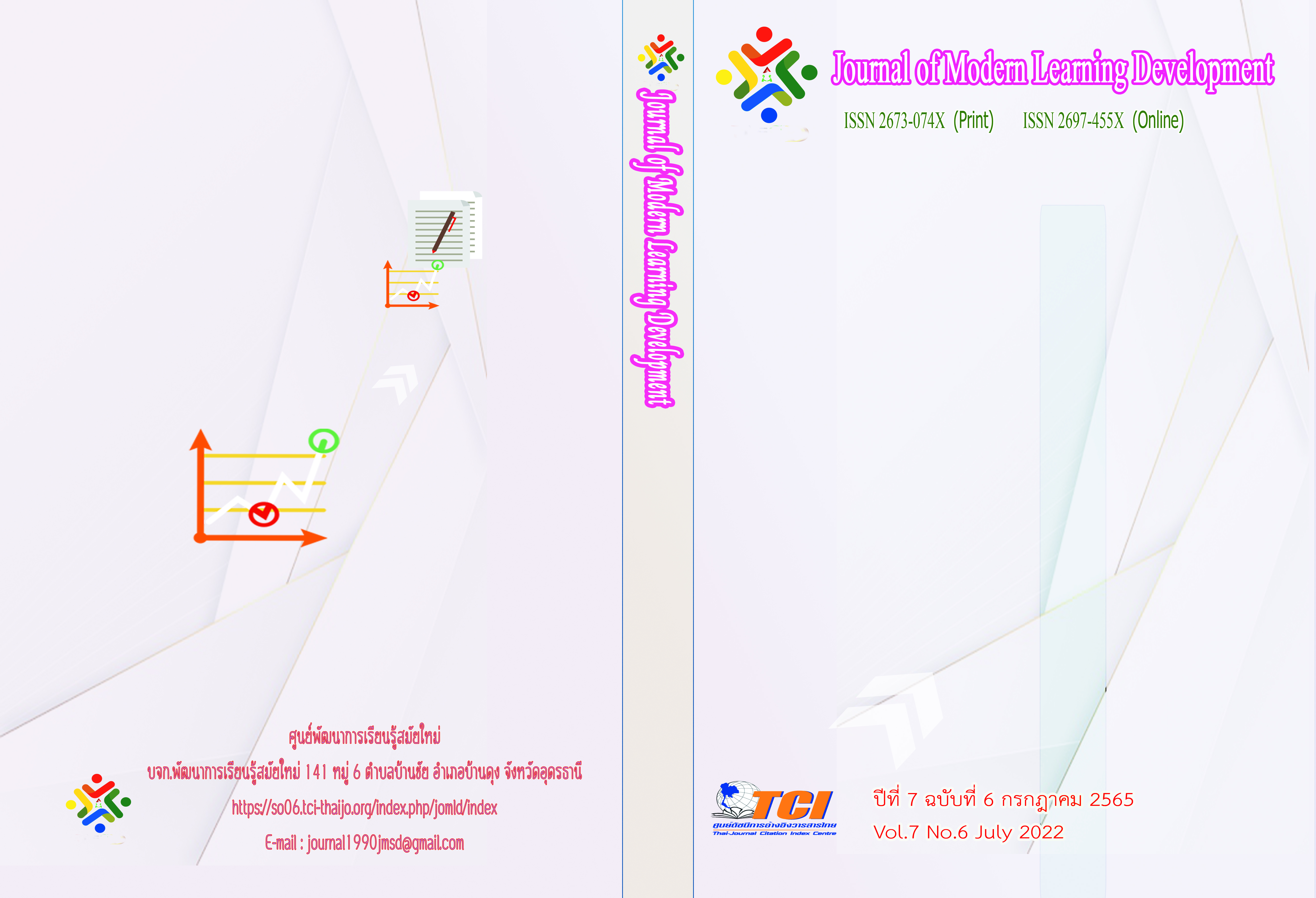The Development of Critical Reading Ability of Mathayomsuksa 3 Students by Phenomenon Based Learning with Six Thinking Hat
Main Article Content
Abstract
The research objectives in the research are 1) To compare critical reading ability of secondary 3 students before and after using the Phenomenon-Based Learning Management together with the Six Hats concept. 2) To study the satisfaction of secondary 3 students who received a phenomenal-based learning arrangement together with the six hats concept by organizing phenomenal-based learning together with the six hats concept. It follows a 3-step research and development process: 1)Create and find the effectiveness of a learning management plan. 2) Comparison of critical reading ability before and after learning management by using phenomenon-based learning and six hats concept. 3) To study the satisfaction of the students who received the learning management by using the phenomenon-based learning arrangement together with the six hats concept.The sample group consisted of secondary 3 students, semester 2, academic year 2021.Wat Khao Ruak School TaphanHin District Phichit Province, 1 classroom, 19 students by a specific random method The research tools were 1) A learning management plan for developing critical reading abilities of secondary 3 students using a phenomenon-based learning management together with the six hats concept. 2) A test to measure the critical reading ability of secondary 3 students 3) The satisfaction scale of secondary 3 students who received phenomenal-based learning management in combination with the six hats concept.
The following were the results
1. The results of the assessment of critical reading ability of Year 3 students who received a phenomenal-based learning arrangement with the Six Hats concept. The scores after school were significantly higher than before at the .05 level.
2. The results of a study of the satisfaction of grade 3 students who received a phenomenal-based learning management together with the six hats concept. Satisfaction was at the highest level.
Article Details
References
ทิวาร์ ศรนรินทร์. (2558). การเปรียบเทียบการคิดวิจารณญาณและผลสัมฤทธิ์ทางการเรียนของนักเรียนชั้นมัธยมศึกษาปีที่ 3 ระหว่างวิธีการจัดการเรียนรู้โดยใช้เทคนิคหมวกหกใบกับผังกราฟิก. วิทยานิพนธ์ ค.ม. (หลักสูตรและการสอน). บัณฑิตวิทยาลัย: มหาวิทยาลัยราชภัฏรําไพพรรณี.
ทัณฑธร จุ้ยสวัสดิ์. (2564). การพัฒนาผลสัมฤทธิ์ทางการเรียนและทักษะการคิดอย่างมี วิจารณญาณของนักเรียนชั้นมัธยมศึกษาปีที่ 5 ด้วยการจัดการเรียนรู้โดยใช้ปรากฏการณ์เป็นฐาน.การศึกษามหาบัณฑิต. บัณฑิตวิทยาลัย: มหาวิทยาลัยบูรพา.
เนาวนิตย์ สงคราม. (2556). การสร้างนวัตกรรมเปลี่ยนผู้เรียนให้เป็นสร้างนวัตกรรมจากงานวิจัยสู่การปฏิบัติ. กรุงเทพมหานคร: จุฬาลงกรณ์มหาวิทยาลัย.
พงศธร มหาวิจิตร. (2562). การประยุกต์ใช้แนวคิดการเรียนรู้โดยใช้ปรากฏการณ์เป็นฐานร่วมกับการเรียนรู้แบบเชิงรุกในรายวิชาการประถมศึกษาเพื่อเสริมสร้างทักษะ การเรียนรู้ในศตวรรษที่ 21. วารสารศึกษาศาสตร์ มหาวิทยาลัยขอนแก่น. 42 (2), 73-90.
ยุพาวดี มหาหิงค์. (2557). การพัฒนากิจกรรมการเรียนรู้แบบผสมผสารร่วมกับหมวกความคิด 6 ใบ เพื่อ ส่งเสริมความสามารถในการคิดอย่างมีวิจารณญาณ สำหรับนักเรียนชั้นประถมศึกษาปี ที่5. กศ.ม สาขาวิชาหลักสูตรและการสอน. บัณฑิตวิทยาลัย: มหาวิทยาลัยนเรศวร.
วิริยา วิริยารัมภะ. (2551). การเปรียบเทียบผลสัมฤทธิ์การอ่านอย่างมีวิจารณญาณ ของนักเรียนชั้น มัธยมศึกษาปีที่ 2 ที่สอนโดยใช้เทคนิคการคิดแบบหมวกหกใบ และวิธีสอนแบบปกติ.นครปฐม : สาขาวิชาการสอนภาษาไทย ภาควิชาหลักสูตรและวิธีสอน บัณฑิตวิทยาลัย: มหาวิทยาลัยศิลปากร.
Silander, P. (2015). Phenomenon – Based Learning: การเรียนรู้โดยใช้ปรากฏการณ์เป็นฐาน. แปลจาก How to create the school of the future: revolutionary thinking and design from Finland. แปลโดย เรวณี ชัยเชาวรัตน์. ออนไลน์. สืบค้น 17 กรกฎาคม 2564. แหล่งที่มา: https://thepotential.org/knowledge/phenomenon-based-learning/


